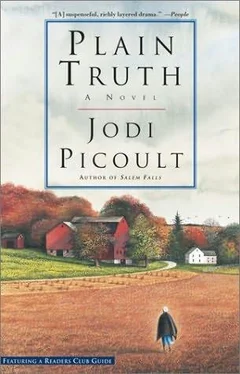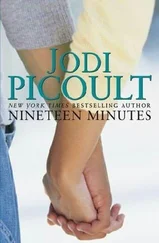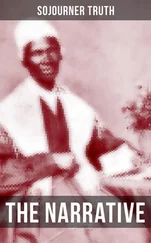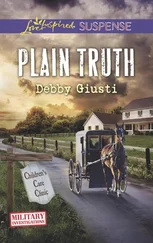Ellie’s hand stopped midway to her mouth, the pork rind forgotten. “Are you saying it’s possible that the baby died of this mystery infection, and not asphyxia?”
“Yeah,” the pathologist said. “I’ll let you know.”
That night, there was going to be a frost. Sarah had heard from Rachel Yoder, who’d heard from Alma Beiler, whose rheumatoid arthritis swelled her knees to the size of melons every year before the first drop of temperature. Katie and Ellie were sent out to the garden to pick the remaining vegetables-tomatoes and squash and carrots as thick as a fist. Katie gathered the food in her apron; Ellie had taken a basket from inside the house. Ellie peered under the broad-backed leaves of the zucchini plant, looking for strays that had made it this far into the harvest season. “When I was little,” she mused, “I used to think that babies came from vegetable patches like this.”
Katie smiled. “I used to think babies came from getting poked with needles.”
“Vaccines?”
“Mmm-hmm. That’s how the cows got pregnant; I’d seen it done.” Ellie had, too; artificial insemination was the safest way to breed the milking herd. Katie laughed out loud. “Boy, did I kick up a fuss when my Mam took me to get a measles shot.”
Ellie chuckled, then sawed a squash off a vine with a knife. “When I found out for real about babies, I didn’t believe it. Logistically, it didn’t seem like it would work.”
“I don’t think so much about where babies come from now,” Katie murmured. “I wonder about where they go.”
Rocking back on her heels, Ellie gingerly set down the knife. “You’re not going to make another confession right now, are you?”
Smiling sadly, Katie shook her head. “No. Your defense strategy is safe.”
“What defense strategy?” Ellie muttered, and at Katie’s panicked glance she scrambled to cover her own words. “I’m sorry. I just don’t quite know what I’m going to do with you now.” Ellie sank down between the rows of bean plants, picked bare weeks ago. “If I had never walked into that courtroom-if I had let you try to defend yourself the way you wanted-you would have been declared incompetent to stand trial. You would have been acquitted, most likely, with the promise of psychiatric care.”
“I’m not incompetent, and you know it,” Katie said stubbornly.
“Yes, and you’re not insane. We’ve already had this conversation.”
“I’m also honest.”
“Amish?” Ellie said, hearing incorrectly. “I think the jury will get that, given your clothes.”
“I said honest. But I’m Amish, too.”
Ellie yanked at the curly head of a carrot. “They might as well be synonyms.” She tugged again, and as the root came flying out of the ground, she suddenly realized what she’d said. “My God, Katie, you’re Amish.”
Katie blinked at her. “If it’s taken you this many months to notice, I don’t-”
“That’s the defense.” A grin spread over Ellie’s face. “Do Amish boys go to war?”
“No. They’re conscientious objectors.”
“How come?”
“Because it isn’t our way to be violent,” Katie replied.
“Exactly. The Amish live according to the literal teachings of Christ. That means turning the other cheek just like Jesus-not just on Sundays, but every single minute of the day.”
Puzzled, Katie said, “I don’t understand.”
“Neither will the jury, but they will by the time I’m finished,” Ellie said. “You know why you’re the first Amish murder suspect in East Paradise, Katie? Because-quite simply-if you’re Amish, you don’t commit murder.”
Dr. Owen Zeigler liked Ellie Hathaway. He had worked with her once before, on a case involving an abusive husband who’d beaten his pregnant wife and caused her to lose her twenty-four-week fetus. He liked her no-nonsense style, her boy’s haircut, and the way her legs seemed to reach all the way to her neck-something anatomically impossible, but stimulating all the same. He had no idea who or what her client was this time around, but the way things were shaping up, Ellie Hathaway was going to get her reasonable doubt-however slim it might be.
In the owl-eye of his microscope, Owen scrutinized the results of the Gram’s stain. There were clusters of dark blue Gram-positive short rods, cocco-bacillary in shape. According to the culture results of the autopsy, these had been identified as diphtheroids-basic contaminants. But there were a hell of a lot of them, making Owen wonder if they were truly diphtheroids after all.
Ellie, actually, had planted the seed of doubt. What if those Gram-positive rods were signs of an infectious agent? A cocco-bacillary organism could easily be misinterpreted as a rod-shaped diphtheroid, especially since the microbiologist who’d performed the test hadn’t done the Gram stain.
He slipped the slide from the scope, cradled it in his palm, and walked down the hospital hall to the lab where Bono Gerhardt worked. Owen found the microbiologist huddled over a catalog of reagents. “You picking out your spring bulbs?”
The microbiologist laughed. “Yeah. I can’t decide between Holland tulips, herpes simplex virus, or cytokeratin.” He nodded at the slide Owen had brought. “What’s that?”
“I’m thinking either Group B beta-hemolytic strep or listeria,” Owen said. “But I was hoping you might be able to tell me for sure.”
Shortly before ten o’clock, the members of the Fisher family would put down whatever they were doing and gravitate, as if pulled by a magnet, to the center of the living room. Elam would say a short German prayer, and then the others would all bow their heads in silence for a moment, offering up their own tribute to God. Ellie had watched it for months now, always recalling that first suspicious conversation she’d had with Sarah about her own faith. The discomfort she’d initially felt had given way to curiosity, and then to indifference-she’d finish reading whatever article she’d been skimming in the Reader’s Digest or one of her own law books, and then go up to bed when the others rose.
Tonight, she and Sarah and Katie had been playing Scrabble. It had gotten almost giddy, with Katie insisting that phonetically spelled words of Dietsch be allowed to count. When the cuckoo clock chimed ten times, Katie dumped her tray of letters into the box, followed by her mother. Aaron, who’d been in the barn, came inside on the wings of a frigid swirl of air. He hung up his coat and went to kneel beside his wife.
But that night, when Elam said the Lord’s Prayer, he recited it in English. Surprised by the overture-the Amish prayed in German, or at the very least, Dietsch-Ellie found her lips moving along. Sarah, whispering too, lifted her head. She looked at Ellie, then shifted the slightest bit to her right, to make a space.
How long had it been since Ellie had prayed, really prayed, not a last-minute send-up as the jury was filing in or when the highway patrolman had caught her doing eighty-five miles per hour? What did she have to lose? Without responding to her own questions, Ellie slipped from her chair and knelt beside Sarah as if she belonged, as if her thoughts and hopes might be answered.
“Bono Gerhardt,” the man said, sticking out his hand. “Charmed.”
Ellie smiled at the microbiologist Owen Zeigler had introduced her to. The man was only about five foot four and wore a surgical scrub cap on his head, printed with zebras and monkeys. A Guatemalan worry doll was pinned to his lapel. Around his neck were headphones, which snaked into a Sony Discman in his right pocket. “You missed the incubation,” he said, “but I’ll forgive you for coming in after the first act.”
Bono led her to a table, where several slides were waiting. “Basically, we’re trying to identify the organism Owen found by using an immunoperoxidase stain. I cut more sections of the paraffin block of tissue, and incubated them with an antibody that will react with listeria-that’s the bacteria we’re trying to ID. Over here are our positive and negative controls: bona fide samples of listeria, courtesy of the veterinary school; and diphtheroids. And now, lady and gentleman, the moment of truth.”
Читать дальше












